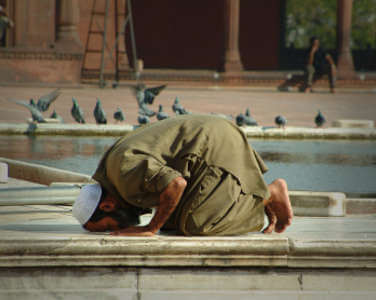
charged two Christians and their four Muslim friends with “hurting
religious sensibility” just three days after they were cleared of any
wrongdoing.
The accused will appear in court tomorrow to
face the charges, which were filed against them three days after they
were exonerated on April 10. They had been arrested on March 24 in
Damurhuda, Chuadanga district, some 210 kilometers (126 miles) northwest
of Dhaka, under Section 54 of the penal code, which provides a special
power to police to arrest anyone on any suspicion. They were released on
bail three days later.
Mannan Mridha, a pastor in the Way
of Peace movement of 490 house churches in northwest Bangladesh, told
Compass that the second case was filed only to stop Christian activities
in the area.
“The case was also filed simply to harass the Christians,” Mridha said.
Carpas
Danga camp police from the Damurhuda police station on April 13 charged
the men with “hurting religious feelings” of area Muslims after a
foreign doctor offered Bibles to patients at a health camp where the
accused were volunteering. The accused men, including the four Muslims
previously misidentified as Christians, appeared in district court on
June 1.
A group of Christians under the direction of the
Way of Peace movement had arranged a two-day health camp offering free
treatment to poor villagers in Damurhuda earlier this year. Around 100
villagers attended the camp for free treatment on March 23, and a
Japanese doctor treated them. The next day, more than 400 people were
supposed to attend the health camp.
The Japanese volunteer
doctor offered Christian leaflets and Bibles to the patients, telling
them they were under no obligation to take the literature, sources said.
Area Muslims stirred up residents against the doctor, according to
police, and the angry villagers had police arrest the Christians. The
foreign doctor was not named in either of the cases filed against the
six nationals.
“These books seriously hurt the religious
sentiments among the Muslims,” police charged in the second case. “After
thorough investigation, we found it true that the accused were engaged
in the activities of hurting religious sentiments.”
One of
the accused, 30-year-old Christian convert Nurul Islam, told Compass
that the Japanese doctor had discussed with villagers the devastation of
the earthquake and the tsunami that ripped through northeastern Japan
on March 11, showing some pictures of its destruction published in
newspapers.
“He also talked about life, how transient it
is, and also about eternal life in the after-world,” said Islam. “He
recited some verses from the Bible about eternal life and how to achieve
it. Then he told the people that he had Bibles, so anyone could take
them if they liked.”
The volunteers at the clinic said they did not expect the doctor to offer this spiritual message.
“In
fact, we were not informed and did not know that the Japanese doctor
would distribute Bible[s] among the patients,” Islam said. “He did it
spontaneously.”
The Christians had obtained permission from
the government to operate the free health camp. They had urged
officials and police to provide protection to the doctor, as Maoist
insurgents in western Bangladesh are known to kill and kidnap area
residents. The government provided two policemen.
“The
police investigation alleged that we were propagating Christianity under
the cover of free treatment,” Islam said. “If we had that kind of
motive, we would not seek permission from the government and police. We
would have done it secretly.”
Villagers were not upset about the Bible distribution, he said.
“At
that time a Cricket World Cup match was going on,” he said. “So there
was a huge hue and cry in a nearby club over the afternoon match.”
Suddenly four policemen appeared in the health camp out of nowhere, he said.
“Police
told us, ‘For security reasons, you need to come with us. If you stay
here, you will be in trouble,’” Islam said. “Police also said, ‘We will
let you free in the nearby Carpas Danga police camp.’ But later they
took us to the Damurhuda police station.”
At the police station, officers confiscated their watches, mobile phones, belts, glasses and money, he said.
“Later
police went to the hotel room that we had booked for guests coming from
Dhaka,” Islam said. “They went there and rummaged through everything.
We had medicines there, which we did not find after the police search.
Police arrested two Muslims from that hotel. In total, the role of
police was very mysterious.”
Way of Peace’s Mridha said the police’s witnesses were less than credible.
“In
this case, police used three witnesses who are drug peddlers and
smugglers living near the Indian border,” he said. “Police did not use
any good villager as a witness. Police should improve the law-and-order
situation of the country, rather than put our lives in trouble.”
Contradiction
Under
Section 54, police are required to submit a primary investigation
report within 15 days of beginning prosecution, sources said.
A
judge asked police to submit a report against the Christians about
their accusations, but officers were unable to submit anything, they
said. Receiving no convincing answers from police, the judge discharged
all the accused Christians on April 10.
The second case filed
by police Sub-inspector Jubaet Khan, however, claims, “The accused have
done recognizable offense, and they were sent to the honorable court
under section 54 of the penal code, and a report was submitted to the
court.”
The Bangladeshi constitution provides for people to
propagate their religion subject to law, but authorities and communities
often objected to efforts to convert people from Islam, according to
the U.S. Department of State’s 2010 International Religious Freedom
report.
Bangladesh is the world’s third-largest
Muslim-majority nation, with Muslims making up 89 percent of its
population of 164.4 million, according to Operation World. Christians are less than 1 percent of the total, and Hindus 9 percent.











































